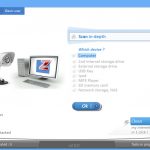PrivaZer improves Chrome cleanup, extends browser support

Goversoft’s excellent privacy and system cleanup tool PrivaZer has today been updated to version 2.0.0, with a range of additions and improvements making it now more thorough than ever.
Enhanced Chrome cleanup sees the program now wipe the browser’s omnibox history, for instance, along with its stored passwords, download history and journals.
Government censorship -- no matter how well-intentioned -- can never be a good thing

My colleague Mark Wilson wrote an interesting article on Sunday about the futility of ISPs and governments trying to block pornography. If you’ve been following the news you’ll know the UK government intends to make accessing adult content on the internet "opt in". That's perfectly legal adult content by the way -- not just the nasty stuff.
Mark also worried about where such a move could lead, saying, "In filtering out porn, how could I be sure that whoever is doing the filtering is not also blocking access to other things, be it through a sense of morality, or by simply miscategorizing something?" Which, it turns out, could be truer than he knew.
On the futility of blocking porn and torrent websites, Immunicity style

Pornography has been in the news a great deal, and David Cameron's bid to make online porn "opt-in" has sparked a fierce debate in many quarters. The apparent aim of the proposed measure is to protect children and the responsibility has been moved squarely to the door of ISPs, just as with access to torrent sites. But is this fair?
The Internet is an important element of democracy. It should be a tool for free speech, free access to information and the ability to communicate worldwide free of charge. Freedom is at the heart of it. Creating a two-tier Internet in which some people are able to access all content, and others can only access a portion of it flies in the face of what the world wide web is all about. It is also dangerous.
Mozilla: Browsers could share your interests with websites

Your web browser records everything you do on the web. It knows where you go, it knows where you’ve been, what your favorite websites are, and it likely even knows your passwords. But fortunately it doesn’t share that information with the world. At least not yet.
Mozilla, the non-profit behind Firefox, is proposing to change that. The organization wants your browser to be able to tell websites the sort of things you’re into, allowing those sites to serve up personalized content tailored just for you.
Suck it up -- you're still going to get spied on after House votes for continued NSA surveillance

A move to close down NSA surveillance of US phone records bites the dust after a vote at the House of Representatives. The closely fought battle ended with a nail-bitingly tight vote that saw 217 votes against limiting the Agency's data collection abilities and 205 for.
Republican Justin Amash looked to end the indiscriminate collecting of phone records that was brought to light by whistleblower Edward Snowden. Rather than looking to simply stop the NSA's actions, the proposed amendment took a slightly different approach and aimed to block funding instead.
TCHunt can uncover hidden TrueCrypt volumes on your drives

TrueCrypt is an excellent encryption tool, a very good choice for anyone who wants to protect their most confidential files. If you use its ability to save your documents in hidden containers, though, it’s worth keeping in mind that these aren’t quite as secret as you might think: TCHunt, a free Windows tool, can identify (though not decrypt) them in just a few seconds.
The program comes in the form of a compact (244KB) executable, with no extras and no installation required; you can just download and run it.
Curious what the NSA gleans from your Gmail? Now you can see for yourself

Ever since Edward Snowden leaked what seems to be the mother lode of the decade, the internet has been fervently abuzz with speculation about Prism. The (aptly named) program was setup by the United States NSA (National Security Agency) to work hand in hand with internet giants to cull over mountains of data related to users of numerous services from Facebook to Gmail to Hotmail. Whether or not this information is accurately being used for its intended purpose -- thwarting terror attacks -- is still up for debate. But one thing we do know for sure is not only the type of data being plucked, but more importantly the overarching power this data yields.
It seems the crafty folks at MIT haven't been sitting back and watching this drama unfold. They've gone ahead and launched a representative cloud tool called Immersion that is very accurate in its portrayal of the inner workings of your entire digital life (or at least, the one contained to your Gmail account). National Journal's Brian Fung first covered this astonishing project, and it was since picked up similarly by eWeek.
Will Google Glass turn us all into government spies?

On 4 July, the founder of PRserve, Chris Barrett videoed an arrest that followed a fist fight on the Jersey Shore boardwalk.
We live in a world where such actions are routinely recorded on smartphones and uploaded to YouTube, but what makes Chris’s video unusual is he used Google Glass to film it.
Edward Snowden is trying to be Daniel Ellsberg on Twitter
Edward Snowden is a patriot

It's big news and rightly so. Whistleblower Edward Snowden is now the US government's number one enemy. He is called both a traitor and patriot by the public, press, and government officials. His story sparked a debate over where America's best interests lie, whether in freedom or in safety.
The Justice Department is gathering all the information it needs to press a criminal case against Snowden, who has leaked secret documents on the NSA's expansive surveillance programs. From Snowden's leaks, it appears that the agency is increasingly focused on regular American citizens rather than terrorists and suspected criminals.
Vet social networking app privacy settings with MyPermissions Cleaner

With privacy higher than ever on the news agenda, it is not surprising people are starting to wake up to the fact they have happily allowed all kinds of personal information about themselves to appear online. It might be too late to stem the tide, but if you are thinking about reviewing your personal privacy, one place to start might be with the apps added to various social networks.
If this idea appeals, then desktop users should install one of MyPermissions Cleaner for Chrome, Firefox, Internet Explorer and Safari, while iPhone and Android users can go with Online Privacy Shield -- once done, you are ready to start taking action to tighten privacy settings.
CyanogenMod to receive iMessage-like encryption feature

Former NSA contractor Edward Snowden triggered one of the largest privacy-related scandals, after he revealed information about a secret phone tracking program which targets more than 100 million Verizon customers. The implications are immense, and combined with subsequent leaks, have triggered a shift in privacy and data security approaches.
Following "recent events", CyanogenMod developer Koushik Dutta announced on Google+ that the popular custom Android distribution will receive an iMessage-like encryption feature that will allow users to securely send and receive texts between devices that run CyanogenMod.
How tech companies collect data on you, and what they do with it

Big Brother is watching you. Or rather technology giants like Google, Apple, Amazon, Facebook and Yahoo are. The firms track their users relentlessly, and use that information to provide a tailored online experience (and maybe share it with government agencies).
Baynote, which provides personalized customer experience solutions for multi-channel retailers, has put together an interesting visual insight into what data the tech titans gather about you, how it’s collected, and what purposes it’s put to.
Do Not Track standards do not coalesce

The advertising industry is in a huff over Mozilla’s plans to support "The Cookie Clearinghouse" at the Center for Internet and Society (CIS) at Stanford Law School. The Cookie Clearinghouse starts with some browser behavior changes and adds what Mozilla’s Brendan Eich describes as both block and allow-lists of sites and a mechanism for managing exceptions to them. What would be blocked? Third-party tracking cookies.
The advertising industry is displeased, as it has been in the past when its abilities to track users are impeded.
UK government launches cyber security awareness campaign

As part of its National Cyber Security Programme the UK government has announced the first stage in a new £4 million awareness campaign. The campaign due to be launched in the autumn draws on expertise from various government departments and is led by the Home Office.
Bids are currently being invited from media, PR and creative agencies to produce a communications strategy to educate consumers and small businesses on the risks presented by cyber crime.
Recent Headlines
Most Commented Stories
© 1998-2025 BetaNews, Inc. All Rights Reserved. About Us - Privacy Policy - Cookie Policy - Sitemap.
